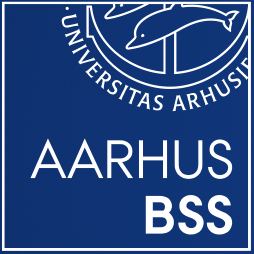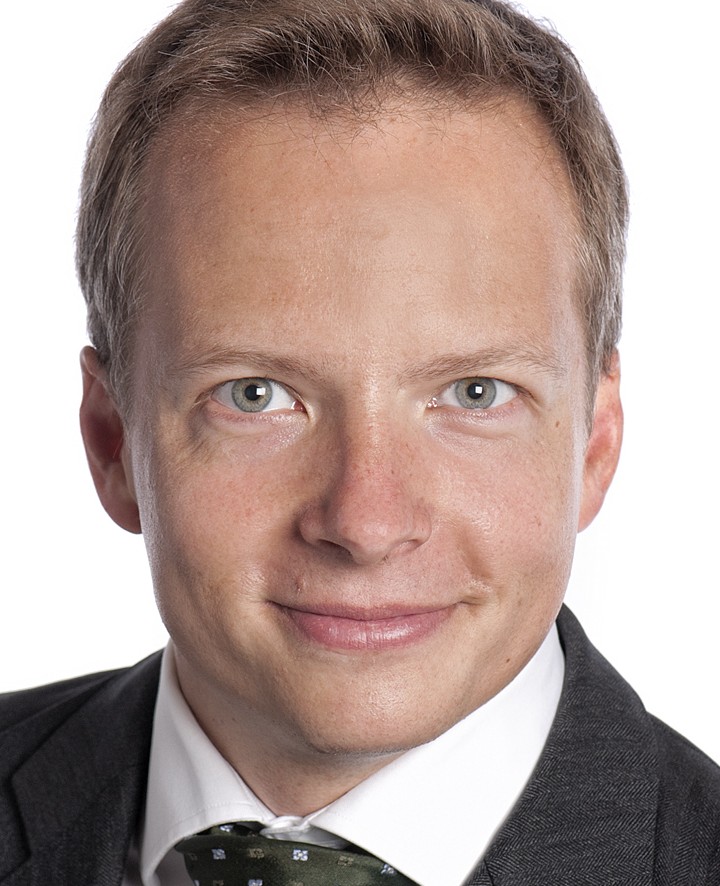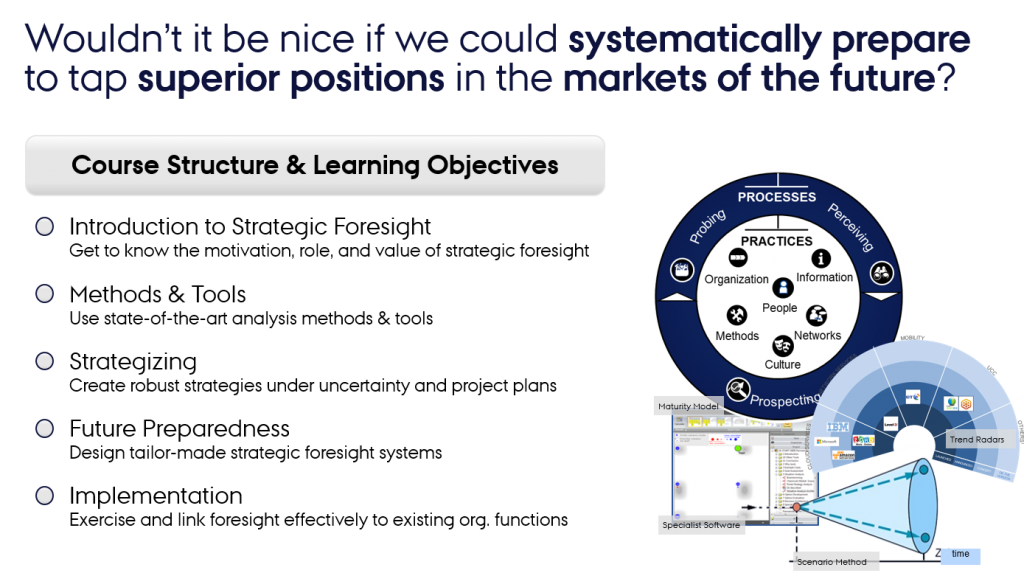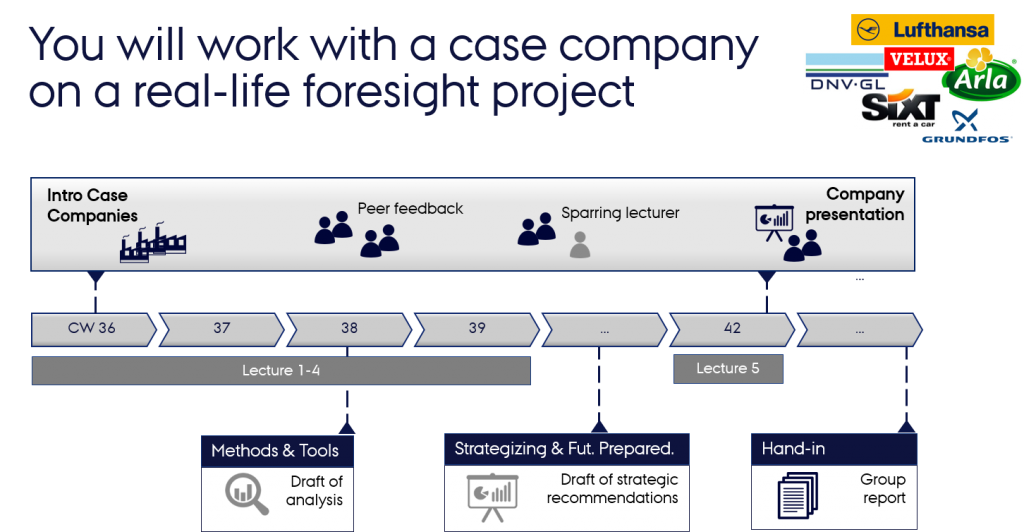Participate in our MSc Elective on Future-Oriented Strategising.
Registration period is May 1st-7th.
How can companies actively create superior positions in markets of the future? What helps them to better see, understand, and act upon change? This course introduces you to the core capabilities of strategic foresight. You will learn how to systematically explore new business fields, build robust scenario-driven strategies, and apply state-of-the-art methods to drive organizations towards a desired future.
What is future-oriented strategising
Today, many organizations are affected by disruptive change. Digitalization is altering the rule of the game in an increasing number of industries. In addition, increasing mobility of capital and ideas (globalization) and the increasing availability of international risk capital, has led the proliferation of plug-and-play organizations. This new breed of companies like AirBnB, Uber or Apple can enter, disrupt and dominate industries within a few years and established companies find it increasingly difficult to prevent being displaced.
While the 20th century was dominated by companies that were rich in assets and good at managing their core competencies, winning in the 21stcentury will depend the ability of organizations to excel in:
- Speed in execution
- Creativity in developing novel value propositions
- Managing the complexity of large and changing networks of value creation partners
This also led to the need to upgrade organizational processes, become more agile in strategizing and grow more aggressive in business development. At the same time they need to strategize under uncertainty which requires novel management practices.
Future-oriented strategizing is becoming increasingly relevant for
- governmental organizations that are confronted with societal challenges and disruptive change
- non-profit organizations that have to identify the needed ingredients for their future success and to understand how they can actively promote needed boundary conditions
- companies in mature industries, industries with a high competitive intensity and rivalry from fast-growing start-up companies.
Description of qualifications
In this course, you will learn and apply state-of-the-art methods, tools and practices for future-oriented strategizing. You will learn how to systematically explore new business fields, how to build robust scenario-driven strategies, and how to use the backcasting technique to drive organizations towards a desired future.
The course builds on more than 10 years of experience in benchmarking and working with leading, international organizations. Building on our maturity model the course introduces you to the six core capabilities of strategic foresight and to its three core processes. Working on a real-life project for a case company, you will learn how to:
Perceive (scanning) to detect change early, using
- social networks
- trend databases
- public and exclusive databases
Prospect to build a deeper understanding than competitors and be able to drive the transition in your industry, using
- scenario analysis
- systematic strategy development
- roadmapping
- backcasting
Probe to collect early feedback from the market, investors, value-chain partners through:
- scanning start-up databases
- analysing investors reports of competitors
- read industry strategy briefings
The course follows a “learning-by-doing” philosophy and you will apply the new knowledge on methods and tools to answer the questions posed by your case companies. In addition, you will have the opportunity to apply sophisticated IT tools and get access to exclusive databases. You will learn both how to plan and execute future-oriented strategy projects as well as how to design and implement strategic foresight systems in different organizational settings.
Learning Objectives and Structure
The course consists in five lectures held in week 36-42. Core part is the work on a real-life foresight project for a case company.
Faculty
René Rohrbeck
 René Rohrbeck is Professor of Strategy at the Department of Management, Aarhus University. Before joining Aarhus University he worked both in public and private organizations. His previous positions include
René Rohrbeck is Professor of Strategy at the Department of Management, Aarhus University. Before joining Aarhus University he worked both in public and private organizations. His previous positions include
- Director of Innovation in EIT ICT Labs (large public private organization funded by the European Commission and private enterprises)
- Head of Innovation Management of the EICT GmbH (funded by Daimer, Deutsche Telekom, Siemens, Technical University of Berlin and the Fraunhofer Institutes)
- Innovation Management and Technological Foresight at Deutsche Telekom and Volkswagen AG.
He advises medium to large companies on innovation management, strategic foresight and technology management. He has worked with companies from a large variety of industries including automobile, oil & gas, pulp & paper, information & communication technologies (ICT) and energy.
Christina Bidmon
Christina Bidmon is a PhD at the Aarhus School of Business and Social Sciences, Aarhus University. Her research focuses on the co-evolution of business m odels and industry transitions. Before joining the Department of Management at Aarhus University, Christina has been working in management consulting and different industry positions related to strategic business development in Germany as well as Northern and Latin America. She studied International Business Administration in Hamburg, Copenhagen and Guadalajara.
odels and industry transitions. Before joining the Department of Management at Aarhus University, Christina has been working in management consulting and different industry positions related to strategic business development in Germany as well as Northern and Latin America. She studied International Business Administration in Hamburg, Copenhagen and Guadalajara.
Exam
In the course you will be asked to work on one large real-life case, which will form the basis for the final oral examination.
In addition small in-class assignments will help you to prepare for the take-home assignement and ensure that you acquire the needed methodological skills.
Registration
You can register for this course via the AU Course Catalogue from May 1st – May 7th.

